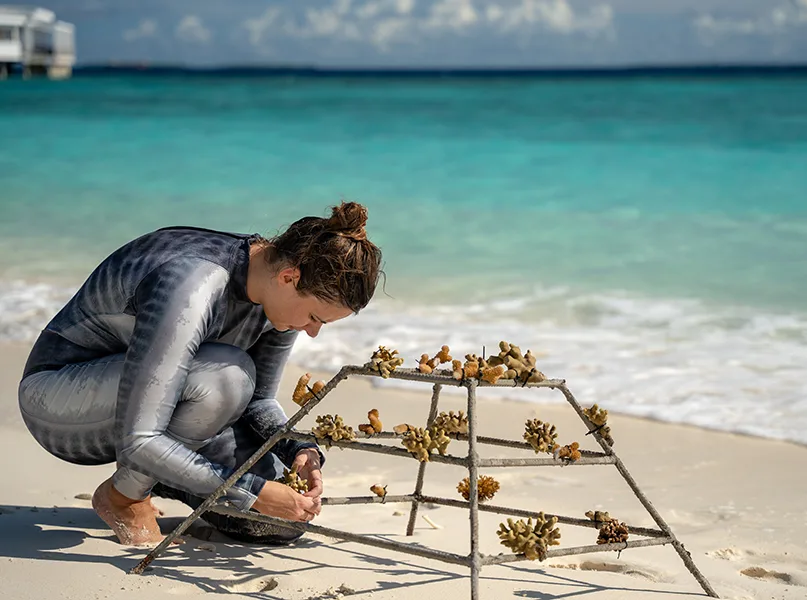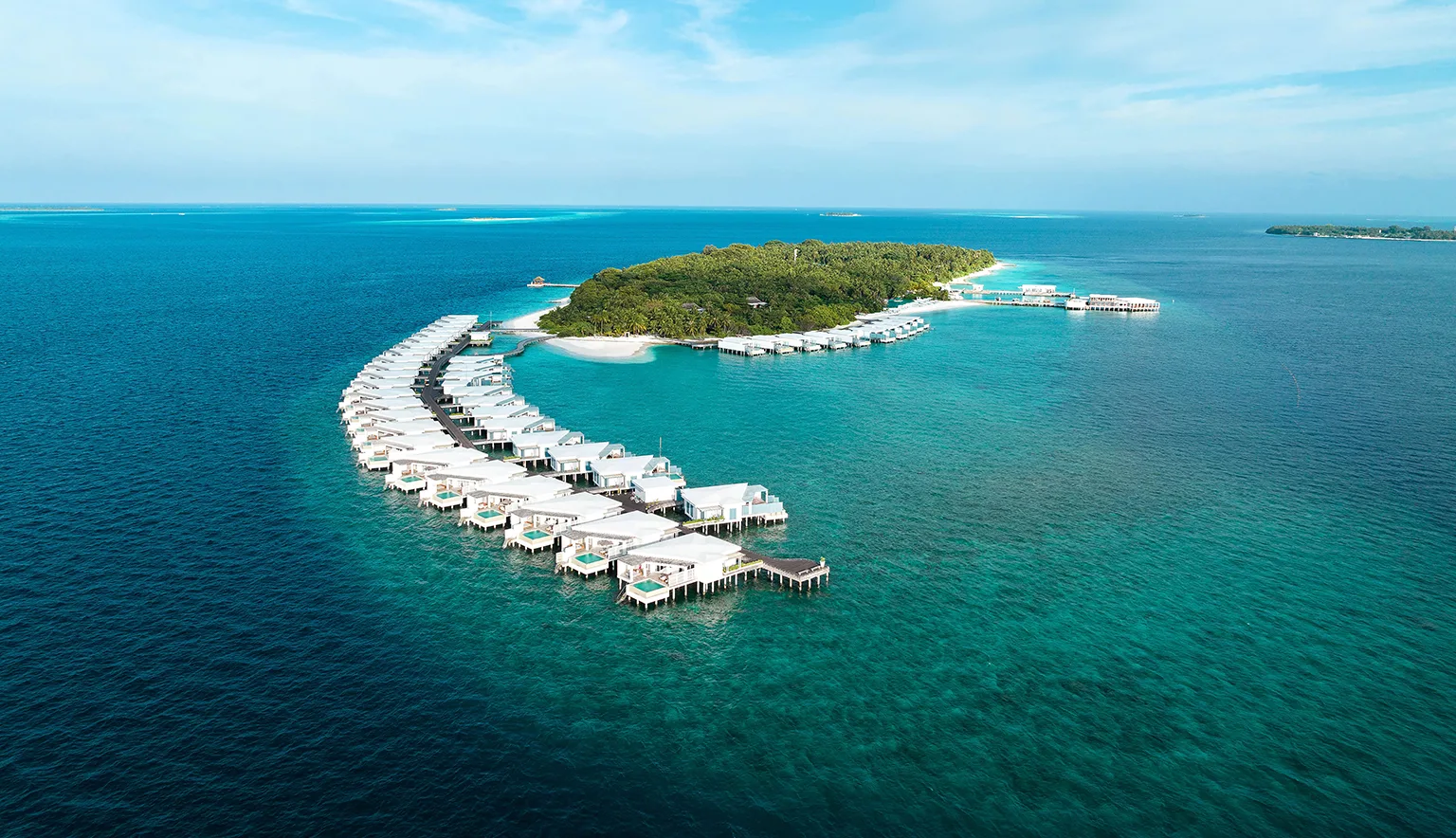Amilla Maldives redefines luxury by intertwining sustainability with indulgence, offering guests a unique experience that celebrates the region’s natural beauty whilst actively preserving its rich marine ecosystems. Narelle McDougall, General Manager, shares her insights on responsible hospitality.
A HARMONIOUS ENVIRONMENT
As the dream vacation destination, the Maldives, an archipelagic state, is an idyllic paradise offering an unforgettable and unparalleled escape – a tropically tranquil haven that will rejuvenate the spirit.
The region consists of more than 1,100 islands arranged in two chains of 26 coral atolls, formed after the eruptions of ancient underwater volcanoes in the Indian Ocean. This unique geological setup supports a diverse array of vibrant marine life and ecosystems.
With a reputation for indulgence and luxury, the South Asian country is renowned for its overwater bungalows and 5-star accommodation. One such enchanting natural island resort is Amilla Maldives (Amilla), designed for couples, families, and groups of friends to relax in the Javvu Spa or enjoy plentiful magical adventures.
Located in the UNESCO World Biosphere Reserve of Baa Atoll, fringed by one of the Maldives’ best house reefs, the island has 67 pool villas and residences.
“We are conscious of the negative impacts a luxury island resort can have on the environment – some are unavoidable, but many can be mitigated, managed, or eliminated altogether, and that belief underpins the sustainability ethos of Amilla,” opens Narelle McDougall, General Manager.
On a continuous journey to create a more sustainable island destination, there is an opportunity to develop eco-friendly initiatives that will appeal to guests and positively impact the lives of the Amilla team and local community.
“We are committed to continual improvement, as measured by annual benchmarking assessments. The team strives to minimise our environmental footprint by implementing sustainable initiatives and reducing energy use, water consumption, and waste generation,” she continues.
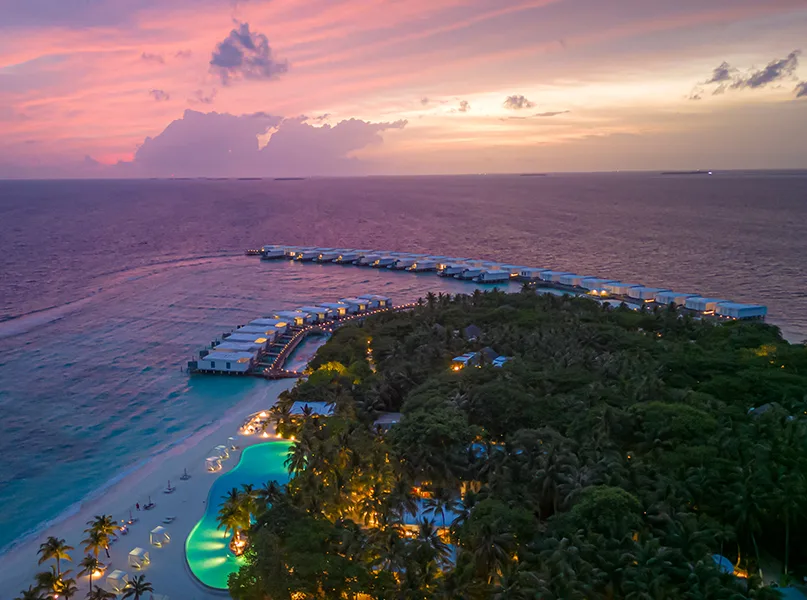
CONVERGING CONSERVATION AND COMFORT
Amilla merges sustainability with a luxurious escape, ensuring guests experience optimum relaxation whilst benefitting from the UNESCO World Biosphere Reserve.
“We encourage guests to enjoy activities that celebrate the serenity and beauty of our natural tropical island setting, for example, through our Homegrown@Amilla and Homemade@Amilla products,” expresses McDougall.
The resort’s Alchemy Bar offers guests the opportunity to explore plant-based remedies that blend modern herbalism with the traditional knowledge of local Maldivian medicine, Dhivehi Beys, with a range of homemade soaps, scrubs, and balms featuring ingredients grown on the island.
Additionally, if Amilla’s guests are interested in pursuing activities, a resident marine biologist – who hosts nature talks and workshops about the island’s flora and fauna – is on hand to lead excursions and snorkelling safaris that immerse guests in the beauty of the marine environment.
“Our resort’s resident marine biologist carefully monitors and maintains the house reef and beaches, supporting our efforts to preserve the marine ecosystem. They host weekly marine biology activities for guests, including coral planting and an adopt-a-coral initiative where guests can receive monthly updates on the progress of their coral frame,” she excites.
The Mini Marine Biologist programme, meanwhile, invites younger guests to explore seven key topics. Upon completion, they ‘graduate’ as certified mini marine biologists, fostering a deeper appreciation for ocean conservation.
Furthermore, guests can also participate in classes focused on wellness and sustainability such as soap, kombucha, and recycled paper making, yoga, cooking, and painting, to name a few.
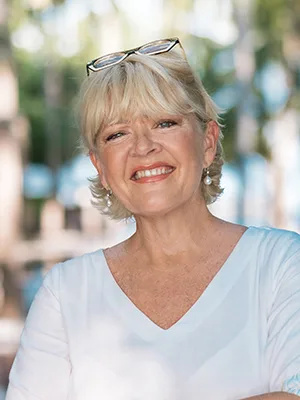
“Our resort’s resident marine biologist carefully monitors and maintains the house reef and beaches, supporting our efforts to preserve the marine ecosystem”
Narelle McDougall, General Manager, Amilla Maldives
HOW ETHICAL SOURCING TRANSLATES TO PLATE
The island used to function as agricultural land. To honour its heritage and Amilla’s sustainability goals, the resort has re-established gardens to help reduce its carbon footprint and plastic waste, providing fresh, organic produce for guests and the team.
“At our Mystique Garden, we cultivate a diverse selection of fresh produce including herbs, fruits, vegetables, microgreens, and lettuce. This low-energy approach minimises resource consumption, ensuring a steady supply of fresh, nutritious produce while reducing our environmental footprint,” McDougall highlights.
The resort features the Mushroom Hut, The Sweet (potato) Spot, and a large-scale hydroponic garden, which aims to meet the kitchen’s salad leaf requirements. Amilla’s plantation is home to small, sweet bananas, and the island boasts 2,500 coconut trees alongside breadfruit, screwpine, and rose apple trees, creating a lush tropical landscape.
To fully utilise the coconut trees, Amilla has its own processing facility, The Nut, which produces all the coconut milk for the resort, as well as cold-pressed oil, coir rope, and many other usable products – once again reducing imports and packaging waste.
“Our chicken coop, Cluckingham Palace, also plays a role in our sustainability efforts as eco-friendly helpers, reducing food waste by happily devouring offcuts of fruits and vegetables. In return, they receive all the essential vitamins they need, ensuring their health and well-being,” smiles McDougall.
Guests can join the chef and forage for their lunch, handpicking fresh produce straight from the ground. After gathering the harvest and returning to the kitchen, they work alongside the chef to prepare a meal using the ingredients they have collected.
“Sourcing from nature not only pleases the taste buds but also educates and deepens the connection to the land and the food it provides,” she imparts.
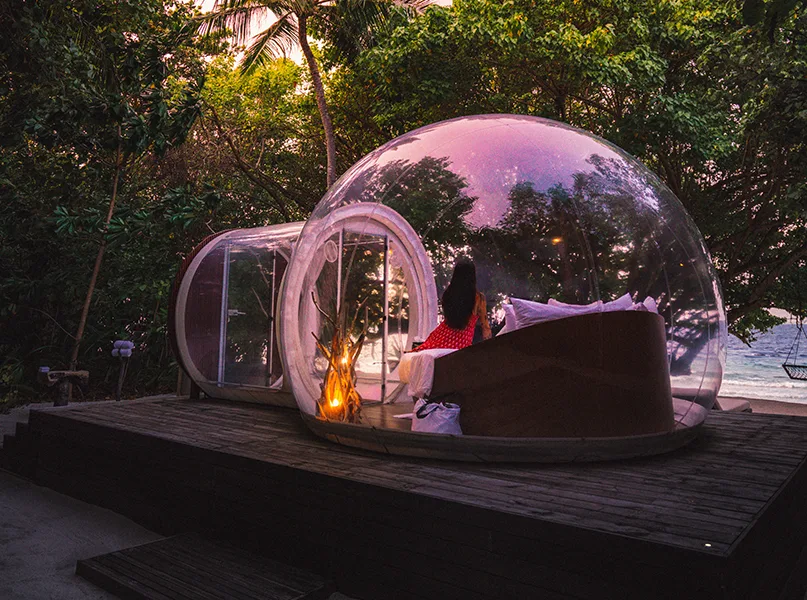
REDUCING PLASTICS TO AID MARINE BIODIVERSITY
When guests arrive at Amilla’s lounge, they are supplied with a Rolla Bottle – a reusable silicone water bottle perfect for filling up at the airport. This negates the need for single-use plastic water bottles provided by airlines, helping to reduce waste.
“We also encourage guests to fill their bottles before departure, ensuring they stay hydrated sustainably throughout their journey home. Our waste management centre, The UN, ensures that waste items produced by the resort are sorted for recycling, composting, or disposal,” reassures McDougall.
In collaboration with the local non-governmental organisation (NGO), AMC, Amilla supports coral restoration projects and gathers vital data on turtles, manta rays, and sharks.
“To safeguard our reef fish populations and maintain the integrity of our marine ecosystem, fishing from our beaches or villas is prohibited. By treating our reef as a Marine Protected Area (MPA), we ensure that sea life can thrive undisturbed and contribute to the health and biodiversity of the underwater environment.”
The resort’s sustainability goals for 2025 include further reducing paper use by transitioning to QR codes and iPads, introducing a new food waste management system that converts food waste into gas for use in the staff kitchens, and developing new ways to upcycle glass bottles and responsibly enhance the guest experience.
“We will continue to reduce our environmental footprint by expanding coral restoration whilst strengthening partnerships with local suppliers. This includes serving only sustainably and locally caught reef fish and procuring as much as possible from the Baa Atoll farming community. Additionally, we will continue to support local communities through training, education, and conservation efforts,” McDougall enthusiastically concludes.
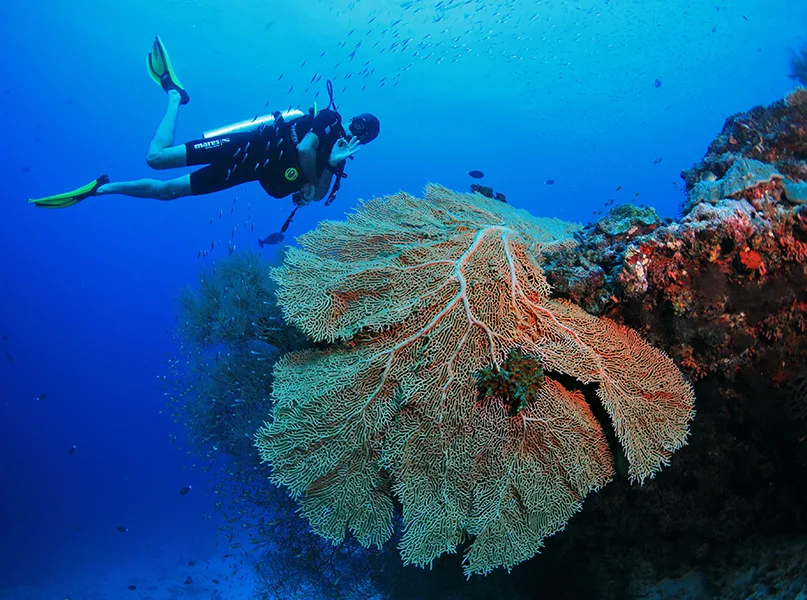
EARTHCHECK INITIATIVES
As the leading scientific benchmarking certification group for travel and tourism, EarthCheck’s science-based and people-focused accreditation processes showcase the sustainability pathway and empower travellers to make well-informed choices around their tourism experiences.
Amilla has been recognised for its commitment to sustainability, accessibility, and inclusivity, with recent accreditations from EarthCheck, Forbes Travel Guide’s VERIFIED™ Responsible Hospitality 2025 programme, and IncluCare.
A recent collaboration with the University of Auckland marked a significant step forward in the conservation of white-tailed tropicbirds. The team successfully GPS-tagged 13 birds and ringed 17 others. Weighing just one percent of the bird’s body weight, the GPS tags allow researchers to non-intrusively monitor feeding patterns, whilst the rings are designed to identify individuals, making it possible to track behaviour and migratory patterns.
Villas are stocked with refillable, post-consumer recycled (PCR)-packaged. vegan-friendly luxury amenities from Swedish brand 19-69 and Dutch social enterprise Marie-Stella-Maris. As part of the Jellyfish10 initiative, Rolla Bottle commits 10 percent of its profits to funding solutions for cleaning up ocean plastic pollution. This is in addition to Amilla’s collaboration with the Atoll Marine Centre (AMC) to support various marine projects.
The resort endeavours to source products from ethical and renewable resources and ensure suppliers follow fair trade principles. Meat suppliers are recognised for treating their animals humanely, meaning its meat products are either free-range or pasture-raised. Where local products are not available, Amilla sources eco-friendly alternatives, reducing and refusing plastic wrapping as much as possible.
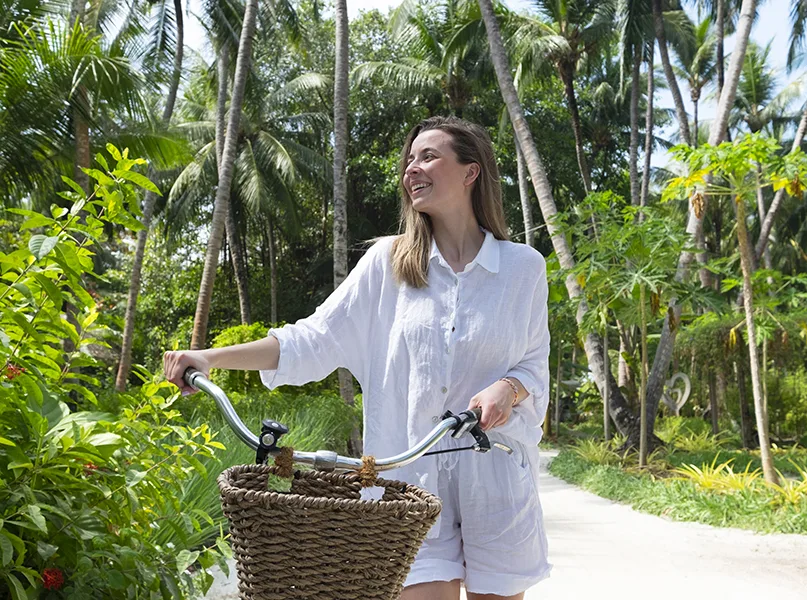
The Amilla approach – R-E-A-C-H out in as many ways as possible.
Amilla has several responsible hospitality goals, including well-being, inclusivity, and sustainability. Guests can immerse themselves in the island’s natural beauty whilst experiencing its commitment to protecting it.
- Responsibility – Responsible hospitality is about environmental sustainability. Equally, it comprises inclusivity for all, removing barriers, engaging, and investing in the local community, culture, employment, and empowerment.
- Environment – As an EarthCheck Silver-certified member of Small Luxury Hotels’ Considerate Collection, Amilla embodies a commitment to sustainability and supporting the local community in achieving the same goals.
- Accessibility – To ensure all guests are catered to, regardless of their needs and abilities, Amilla works to remove barriers not only for physical access but also for hidden disabilities. The geographical nature of the Maldives makes accessibility difficult for many Maldivians; therefore, Amilla aims to support its community in achieving an accessible environment.
- Community – Engaging with local communities in conservation and cultural preservation, integrating and supporting through hiring, local sourcing, and cultural experiences. Amilla empowers the community through projects such as training sessions with councils and NGOs hosting schools for career inspiration trips.
- Harmony – Amilla’s goal is to be harmonious with the community and the surrounding environment, creating a positive presence in tune with local culture and conservation.
